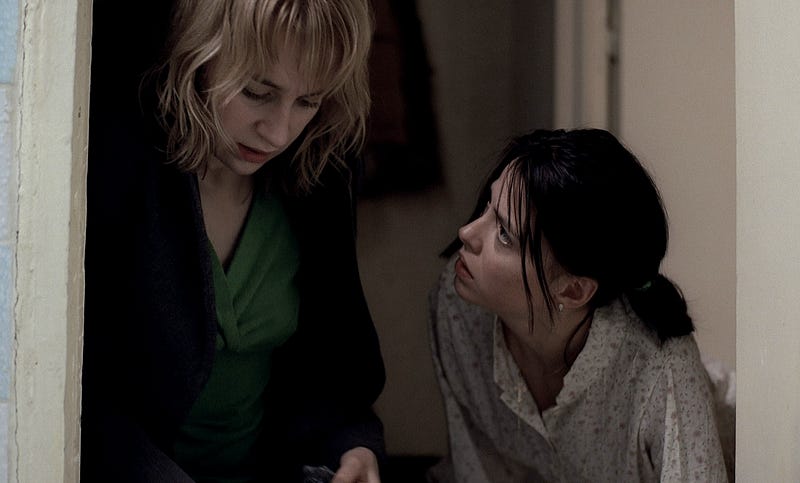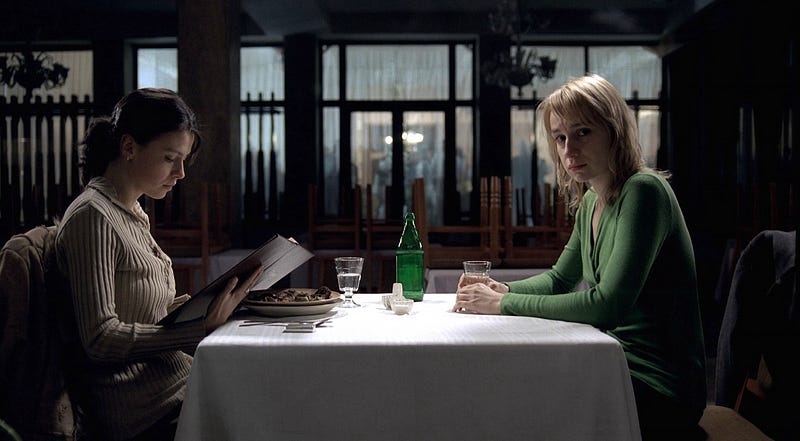The Strength of Minimalist Cinema and Why You Should Watch ‘4 Months, 3 Weeks and 2 Days’
Two years after Roe v. Wade was overturned, I look back at the 21st-century’s best film about reproductive rights
On 24 June 2022, exactly two years ago today, the United States Supreme Court, filled with some truly deranged people – you know, the likes of Clarence Thomas and Amy Coney Barrett – handed down their ruling for Dobbs v. Jackson Women’s Health Organization. In their judgment, they overturned Roe v. Wade and dismantled fifty years of legal protection for abortive care, paving the way for individual states to limit or even place outright bans on access to abortion.
Since that fateful day, when Thomas and Barrett, alongside their Republican buddies Neil Gorsuch, Brett Kavanaugh and John Roberts took America half a century back (literally), twenty-one states have changed their laws to restrict access to abortion below the minimum standard set by Roe v. Wade. Fourteen of them, including Texas, the country’s second most populous state, have imposed an outright ban on terminating pregnancies – including for cases of incest, sexual assault, or when the woman’s life is at risk. It is now possible to be faced with a choice between dying or facing up to 99 years in jail in the Land of the Free.
In fact, the situation in the US is so dire that some of the world’s most authoritarian, misogynistic and patriarchal states, like the United Arab Emirates and Saudi Arabia, have more liberal abortion laws than some US states – with persisting protections continuing to erode under an increasingly emboldened and dangerously conservative Supreme Court.
The two-year anniversary of perhaps the most significant and consequential example of the political class’s unrelenting attacks on marginalised communities has had me constantly thinking about one of the very best movies I have seen, Cristian Mungiu’s haunting Palme d’Or winning thriller 4 Months, 3 Weeks and 2 Days – a film that undoubtedly stands to be more relevant now than seventeen years ago, when it was bizarrely snubbed at the Oscars.
4 Months, 3 Weeks and 2 Days microscopically focuses on the plight of Otilia (Anamaria Marinca) and Găbița (Laura Vasiliu), university students and roommates, who try to procure a secretive, illegal abortion in the 1980s during the final years of Nicolae Ceaușescu’s brutal dictatorship in Romania.
Mungiu’s film is simple at its core, yet it is forceful and unmistakably rooted in political realities. He explores the challenges these two face in a bid to exercise what in a just world would be an uncontroversial right with uncommon depth and empathy, painting the broader picture of reproductive rights alongside the brutality of Ceaușescu’s Romania as well as the invisible bonds that tie you together amid the most oppressive and harrowing of circumstances.
The movie’s premise is empathetic, raw and unapologetic, but what sets 4 Months, 3 Weeks and 2 Days apart from other excellent films surrounding abortive rights, such as Eliza Hittman’s Never Rarely Sometimes Always and Audrey Diwan’s L’événement – both of which are brilliant in their own right – is how Mungiu uses unostentatious, minimalist filmmaking techniques to maintain unrelenting tension for the 114 disquieting minutes we spend with these two.
The story remains focused only on Otilia and Găbița’s search for a solution. Everything else, including their relationships and lives falling apart before their eyes, is peripheral – for securing an abortion is their entire world at the moment. The care and empathy with which the story is told is uncommon among even the most progressive and politically charged movies, and the fixation on these two and their fear amidst the looming uncertainty about what will happen makes for gripping, vicarious cinema. You feel like you’re there with Otilia and Găbița – that you’re a part of their nightmare.
This is only amplified by the brilliant script, which does not let the tension abate at any point, as well as Oleg Mutu’s exceptional cinematography, which is defined by his use of focus, framing, and extended takes. Some of the most chilling scenes are defined by the fact that we – the viewers – are forced to witness harrowing events that take place in their entirety for minutes on end. These scenes serve as a reminder of just how effective raw, uncomplicated simplicity – long takes, fixed camera positions, and the use of focus, as opposed to vibrant transitions and camera tricks – can be in making an uncomplicated story so impactful.
All of this comes together with Mungiu’s remarkable and unrestrained vision to create a magnanimous and towering film. One in which you cannot take your eyes off the screen for a second, even though you really do not want to see the agonising things Otilia and Găbița have to go through to simply exercise their bodily autonomy – things that haunt and stay with you long after the credits roll – for which 4 Months, 3 Weeks and 2 Days was rightfully awarded independent cinema’s most coveted award in 2007.
Independent films do not have the budgets that big Hollywood blockbusters do and have to rely on storytelling to make movies that work. The result is often slow and occasionally repetitive films – even if they are well-written. It is difficult to captivate audiences for two hours with just good dialogue and characterisation – cinema is a visual storytelling medium, after all.
Through its effective filmmaking and unquestionable compassion, 4 Months, 3 Weeks and 2 Days emphatically shows that good minimalist filmmaking can offset these limitations and make even obscure indie films the most monumental and captivating works of art you could ever experience. 4 Months, 3 Weeks and 2 Days had a budget of $600,000 – Mungiu could have made this movie 650 times, and it would have cost less than Avengers: Endgame or Fast and Furious 10 (Fast X).
Even more importantly, 2007’s Palme d’Or winner is an example of what makes cinema such a brilliant medium of art. How despite all the camera tricks, special effects, stunts and VFX, it is sometimes through the most simple means that the most powerful, raw and emotionally complex stories are best told. It embodies everything that makes independent international cinema so great.
Two years on from when the US Supreme Court and the Republican Party laid bare (for the umpteenth time) the apathy with which they hold women and their bodily autonomy, the situation continues to worsen with reproductive freedoms continuing to erode in the US – and many other (so-called) civilised countries in the Western Imperial core – with frightening intensity, even as many countries in the Global South continue to rid themselves of their restrictive abortive laws (many of which were imposed by their former belligerent colonial occupiers).
So, I will end this piece by urging you to give the underrated 4 Months, 3 Weeks and 2 Days a watch. It’s powerful, politically charged cinema at its brilliant best – a forceful reminder of the harrowing realities so many face on a daily basis, told through a stellar script, terrific filmmaking, and outstanding performances with a bleak, nerve-racking ending.







